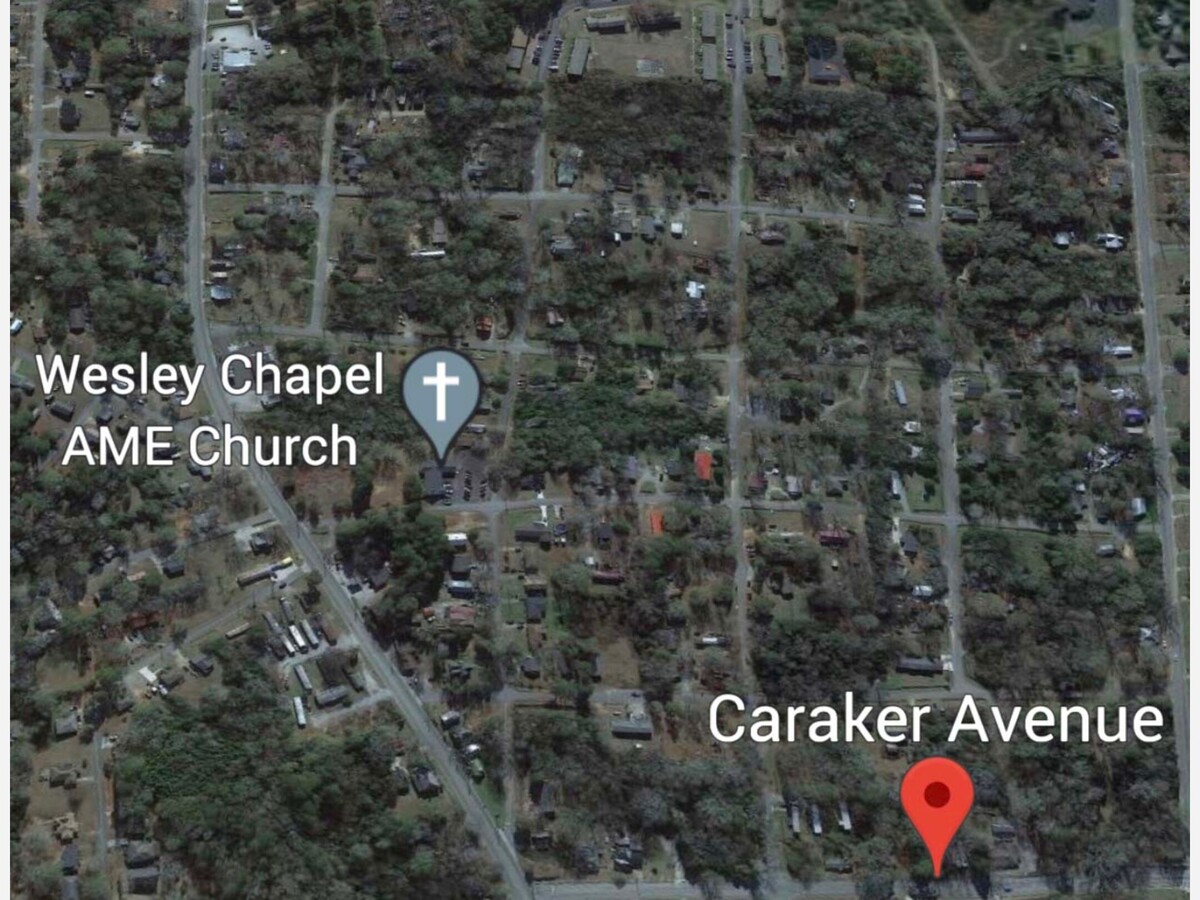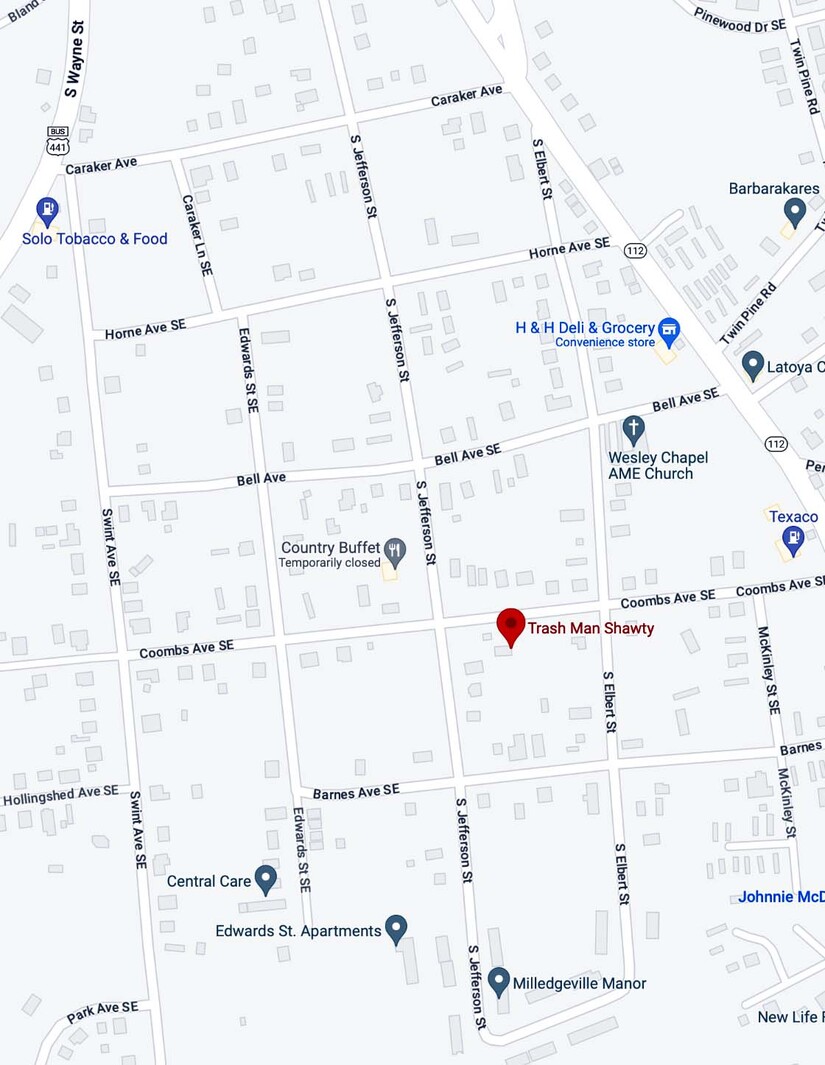Image


Image: Google Earth
Oconee Heights originally was a bedroom community of Central State Hospital, a place with well-manicured lawns and unlocked doors.
However, as Central State started to decline and decay over the years, Oconee Heights started to decline and decay, as well. These days, mobile homes largely have replaced the original houses in Oconee Heights, which can be loosely defined as everything between Caraker Avenue and the Milledgeville Manor, running north and south, and everything between Swint Avenue and the Vinson Highway, running east and west.

Now, though, the old neighborhood is receiving a $4.9 million lifeline, all thanks to money from the $1.2 trillion Infrastructure Investment and Jobs Act (IIJA), which was approved by Congress and signed into law by President Joe Biden in late 2021. According to a dual press release from the offices of Sens. John Ossoff and Raphael Warnock, the Oconee Heights project "will add pedestrian pathways and complete sidewalk connections to enhance community connectivity."
Added the press release: "This investment will also help install over 200 new solar-powered lighting fixtures alongside approximately 3,000 feet of new sidewalk throughout the Oconee Heights neighborhood. Additionally, the grant will be used to replace three failing culverts in the community."
The county commission on Tuesday morning hosted a press conference at Wesley Chapel AME, which sort of has become the hub of the Oconee Heights revitalization efforts. Several commissioners, as well as County Manager Carlos Tobar, were quoted in the press release.
“I want to thank Senators Jon Ossoff and Reverend Raphael Warnock for helping our community become a safer more livable place in beautiful Baldwin County. The Oconee Heights neighborhood desperately needs public investment. This historic Black neighborhood, where many of our civic leaders came from, suffered greatly from the job losses at Central State Hospital,” said Baldwin County Board of Commissioners Chairwoman Emily Davis in the press release. “This neighborhood will now have a safe way to travel to the new jobs on the old campus of Central State Hospital, grocery stores and our local colleges which are in historic downtown. We appreciate the support our U.S. Senators have provided us in our efforts to revitalize this once thriving area."
Added Tobar: “The Oconee Heights Streetscape and Safety Improvements project was the brainchild of two University of Georgia classes that made Oconee Heights its thesis project. Numerous meetings were held in the community and the vision was established to create a safer neighborhood and connect Oconee Heights residents safely to the new jobs at the old Central State Hospital campus, and to grocery stores, colleges, and downtown via walking and bicycling,” said Baldwin County Manager Carlos Tobar.“I thank Senators Ossoff and Warnock for supporting Baldwin County’s efforts to make our county accessible, safe, sustainable and equitable.
The man with the plan around Oconee Heights has been Georgia College & State University Professor Damian Francis. Immediately below is an article written and compiled by the GCSU Office of Communications last year that offers much more context about the ongoing revitalization efforts around Oconee Heights:
At a meeting on what concerns residents – a gentleman from Oconee Heights once asked Dr. Damian Francis if he’d be like all the others – doing one thing to help the community, then disappearing.
“I said, ‘No, we’re here for the long haul.’ That was 2-and-a-half years ago, and we’re still here. We’re showing some benefit now, and residents are really appreciative,” said Francis, an epidemiologist and director of Georgia College & State University’s Center for Health & Social Issues (CHSI).
Francis moved to Georgia from Jamaica in 2018, when his wife got a nursing job in Dublin. Previously, he taught at the University of West Indies in Jamaica and did sickle cell research at the Caribbean Institute for Health Research. In between jobs in the United States, he consulted for the World Health Organization.
When a job opened in public health at Georgia College, Francis applied. He didn’t want to be a “cookie-cutter” professor. So, he took a Center for Teaching & Learning workshop with Dr. Cynthia Alby to become transformative when teaching.
One way to engage students, he learned, is to involve them in research. Francis’ interest is helping people live healthier lives – especially those in low income areas who are known to have higher rates of heart disease, hypertension and diabetes. He wanted to get students involved in health outreach.
To do that, he had them conduct a survey to learn what quality-of-life issues concern Baldwin County residents most.

It wasn’t health.
It was blight—dysfunctional housing and property.
“During our assessment,” Francis said, “we found the needs that residents wanted addressed were things like housing, crime and physical infrastructure in their community.”
“It goes back to Maslow's hierarchy of needs,” he said. “If your house is leaking and you can’t sleep comfortably during the rainy period, that’s going to be more important to you than managing your blood pressure, which you cannot see. People prioritize these needs, because if I can’t sleep well at night, that’s going to affect my blood pressure. If my house is falling apart, that’s going to affect my blood pressure. Without money to fix it, that’s real stress.”
Residents in the Coopers neighborhood in southwest Baldwin County, the Hardwick neighborhood around Central State Hospital and Oconee Heights neighborhood just south of downtown Milledgeville all identified damaged housing as a top concern.
In 2020—prior to the COVID-19 lockdowns—a public health student started assessing the problem in Oconee Heights. Kaitlin Gauthier was a senior at the time. She went door-to-door to map and assess more than 100 houses, checking for things like fire damage, sunken roofs, foundational cracks and fallen trees.

Gauthier and Francis back in 2020
Gauthier helped Francis write a grant application to fund the housing infrastructure assessment. She collaborated with Geography Professor Dr. Doug Oetter to use Geographic Information System (GIS) to create, analyze and map data. Later, another public health student, Kristina Taylor, helped present those findings to county officials in 2021.
Results showed nearly two-thirds of Oconee Heights houses had some level of blight. At least one-third were deemed uninhabitable.
“One of the amazing things was—quite a bit of houses deemed unlivable by the survey were still occupied,” Francis said. “That represents a public health hazard.”
Once county officials were onboard, the data students collected provided support for Baldwin County's designation as a Georgia Initiative for Community Housing community. Then, with letters of support from the university and organizations like Overview Inc. and Habitat for Humanity, the county applied for and was awarded a $400,000 federal Community HOME Investment Program (CHIP) grant this summer. The money will pay to rehabilitate up to eight blighted homes.


Francis is helping county officials select the first round of houses to fix. The elderly and disabled are being given priority. Work will begin at the end of the semester. Progress from this round of improvement can be cited when applying for more CHIP grants in the future.
It’s Francis’ hope that as many as 66 houses can be saved.
“This was a really big success story for the university, the county and residents,” Francis said. “Some people live in houses where, every time it rains, they might as well be living outside. Clearly, some residents were ecstatic to hear the news.”
Still, there were setbacks. Some dilapidated homes needed to be torn down. Demolition, excavation and removal costs anywhere from $5,000 to $10,000. When residents are experiencing poverty or a catastrophe like a house fire that kind of money is hard to obtain.
The county provides funding for trucks to collect and remove debris. So, Francis used CHSI donations to help some residents “push down” houses that were beyond repair. Many only had to pay $10 for the application to demolish.
Another “bottleneck” occurred when Francis realized many residents don’t legally own their homes. Some families pass homes down through generations without updating title deeds. To help those residents, CHSI held a recent property title seminar in conjunction with Dr. Veronica Womack at Georgia College’s Rural Studies Institute and Habitat for Humanity of Milledgeville Baldwin County.
An attorney and financial advisor were on hand to give free legal advice and answer residents’ questions about deeds and inheriting property. Francis is looking into ways to help residents pay for title updates. With that done, they’ll qualify for CHIP money to rehabilitate their homes.
“This was the entry point for getting deeds updated,” Francis said. “To be helping people in such a concrete way–it just gives you this feeling of joy. It’s one of our strategic goals to remove or mitigate some of the obstacles that keep people from living healthy lives, and housing is definitely part of that.

